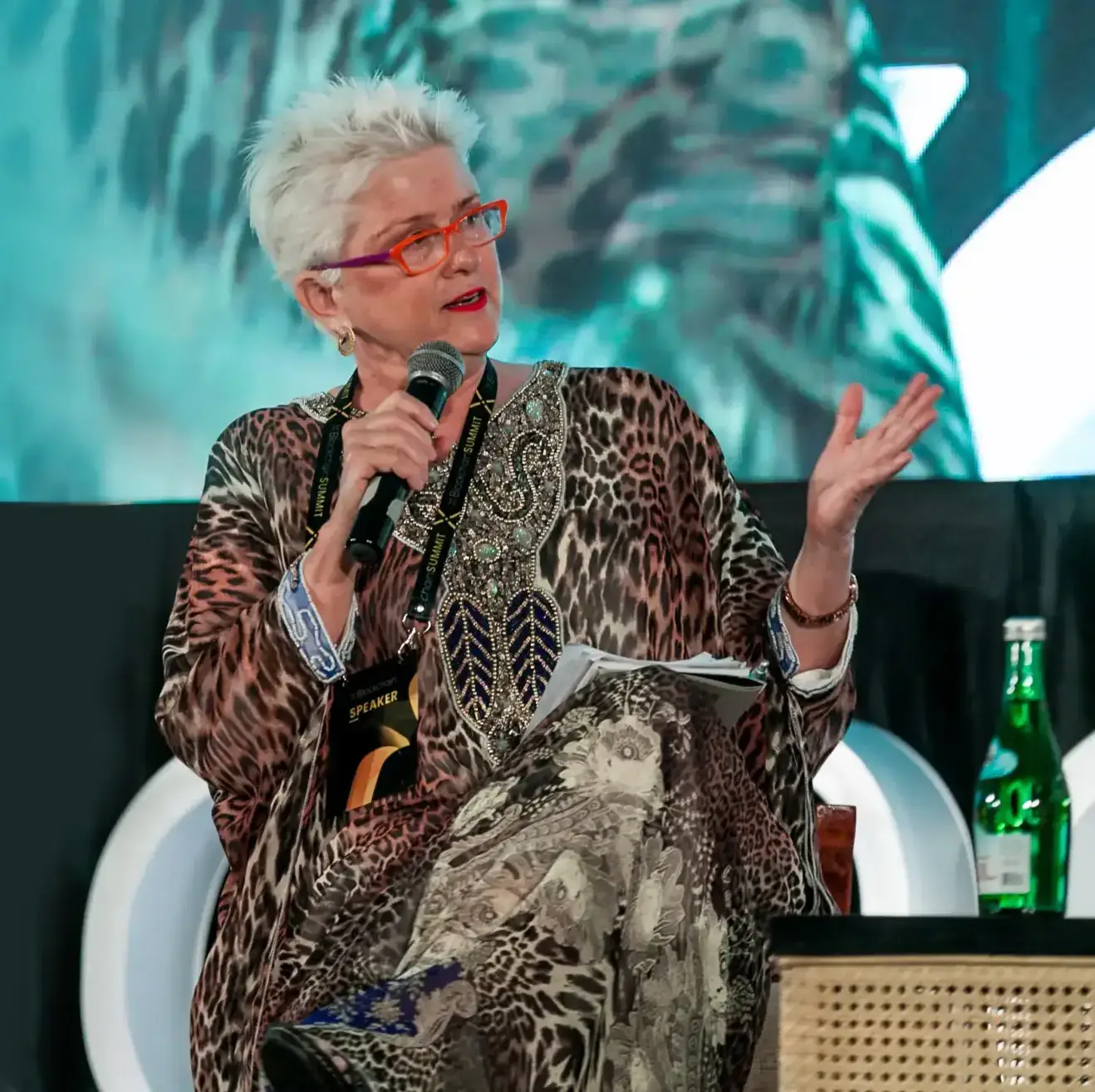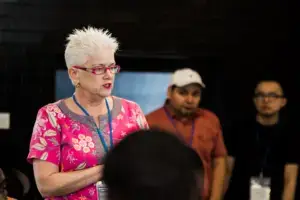


Technology has the tremendous potential to improve the lives of women worldwide: I want to be a driving force to collaborate and make the promise of technology real for poor women and girls around the world.” Dr. Jane Thomason is on a mission to leverage blockchain and decentralization to bring the bottom billion ‘invisible’ people access to opportunities.
Dr. Jane is a visionary social innovator, burning with passion for harnessing technology for digital transformation to reduce inequality and vulnerability. She believes that “To empower a woman is to empower a nation. A woman will invest in her family and her community. Educated women are more likely to contribute to economic growth.”
“I have spent my life working on problems of poverty and inequality in the developing world. I realise that blockchain – if deployed and scaled – could solve some of the global problems of our time, like climate change and poverty. So, my focus for the past five years has been on trying to demystify the technology and explain how it can help us solve problems we have grappled with for decades. Blockchain technology will transform industries and have a significant global economic impact.”
She is a blockchain expert advisor to the World Health Organisation (WHO), the Organisation for Economic Co-operation and Development (OECD), the Asian Development Bank (ADB), USAid and the Commonwealth Secretariat.
Dr. Jane was featured in Forbes as “blockchains’ leading social evangelist” (2018) and has received multiple awards, including Top 100 Women in Crypto from the Crypto Curry Club (2020); Women in GovTech 2019; 10 Digital Frontier Women from the UN Decade Of Women (2018); UN Decade Of Women’s Quantum Impact Champion (2018); Lattice Top 100 Fintech Influencers for SDGs (2018); Thinkers360 Top 20 Global Thought Leaders and Influencers on HealthTech; and Blockchain; and Sustainability.
er expertise sees her serve on several boards, including the editorial boards of the Journal of Metaverse, Frontiers in Blockchain, and Global Health Journal; as an Industry Associate at the University College London’s Centre for Blockchain; and as the author of “Blockchain Technology for Global Social Change”, “Blockchainging the World” and “Applied Ethics in a Digital World.”
She is co-founder of the British Blockchain and Frontier Technology Association; ambassador for Fintech Diversity Radar; and advisor for Kerala Blockchain Association, Africa Blockchain Centre of Excellence, Novum Insights, Shyft Network, and The Standard. She also founded a successful international development company which reached $250 million in revenue.
As Chair of the Board for Kasei Holdings plc, a web3 investment firm listed in the Aquis Exchange in London, Dr. Jane plays a role in the development of web3 and provides a bridge between the legacy world and the world of web3. Kasei Holdings plc is a firm of experienced financial experts who joined forces in the digital asset ecosystem.
The potential of web3 to impact every sphere of life is tremendous. Dr. Jane posits that everyone can benefit from web3’s future – and she advocates that women and girls aren’t left behind in the technological march forward.
 The ‘invisible’ billion people don’t need the latest technology and gadgets. “A 2G mobile phone in the hands of those can change their lives,” said Dr. Jane. “We know that mobile phone ownership can transform women’s lives in the developing world. In a recent study in developing countries, 77-percent of the women surveyed used the internet to further their education. The report found that with USD $150 million, girls and women online could create a market opportunity of between USD $50 billion and USD $70 billion, contributing USD $13 billion to USD $18 billion annually to a developing country’s GDP. The potential for technology to change the lives of women and girls is staggering.”
The ‘invisible’ billion people don’t need the latest technology and gadgets. “A 2G mobile phone in the hands of those can change their lives,” said Dr. Jane. “We know that mobile phone ownership can transform women’s lives in the developing world. In a recent study in developing countries, 77-percent of the women surveyed used the internet to further their education. The report found that with USD $150 million, girls and women online could create a market opportunity of between USD $50 billion and USD $70 billion, contributing USD $13 billion to USD $18 billion annually to a developing country’s GDP. The potential for technology to change the lives of women and girls is staggering.”
The tools of web3 will reshape societies. Dr. Jane believes it will impact how people earn incomes, socialize, learn, get health care, and work.
The Metaverse creates new income streams using blockchain and gamefi. “Play-to-earn, learn-to-earn, and move-to-earn could become primary income for millions of people,” said Dr. Jane. “We will see a new breed of Metaverse economists emerging who will oversee and plan the macroeconomics of Metaverses, just as they do today’s physical economy.”
Socialising is taking a new turn with web3. Decentraland has already started to revolutionize people’s lives and social interactions. The Metaverse will spur crosschain possibilities. She stated: “These purely digital opportunities to make a living inspire younger generations to believe that the Metaverse is the place to make their fortunes. Many gamers have already entered the Metaverse, and more will follow. The idea of meeting and socialising with friends will take place in Metaverse spaces, just as if those people are in the same room. In the Metaverse, we can socialize, attend virtual concerts, travel, shop, go to movies, and other everyday pursuits.”
She highlighted how governments also adopt this new technology in extraordinary ways to foster economic growth for their citizens. South Korea has introduced ‘Untact,’ a policy that removes the layers of human interaction from society. It is building a Metaverse with avatars of public officials where civil services will become virtual. 12 of the 15 Korean unicorn companies now successfully use non-face-to-face methods in their primary business. In Decentraland, the Barbados government is building an embassy.
Web3 will shape the workplace of the future, believes Dr. Jane. “Meetings will be held in virtual meeting rooms. Consider digital whiteboards, digital workstations, etc. The Metaverse gives you the space where you can 3D model anything – and by doing so, enables smarter problem-solving in industries like construction, architecture, healthcare, life sciences, and more. In this way, the Metaverse can also provide large-scale industrial workspaces to test machines and systems through digital twins to detect possible failures and improvements before carrying them out in a physical environment.”
Innovation will accelerate virtual healthcare – all through web3 tools. Dr. Jane shared: “AR and VR are emerging to improve medical education, training, and processes and procedures. Immersive experiences can be recreated from real surgery, and real-time guidance can be provided in the surgeon’s field of view of the surgical site through the integration with surgical navigation systems and a fusion of data from multiple imaging sources. Another area of considerable development is utilizing avatars that can be created for more realistic consultations, personalised care, treatment, and diagnosis through data connectivity. Gamification will connect healthcare providers and patients in wellness and fitness, where AR is used to deliver smarter workouts with guidance from virtual instructors. In moveto-earn games, players are incentivized to be active. One such project, Genopets, uses data tracked by smartphones or fitness wearables to advance their Genopet NFT in-game. Players get rewarded for walking their dog, going to the gym, using the stairs, etc. Genopet’s mission is to make staying active more rewarding through a play-to-earn NFT game.”
VR and AR can improve patient experiences and outcomes through the Metaverse to bring global healthcare professionals together for simultaneous education, training and planning, and collaborative medical procedures. The Metaverse holds incredible potential for transformation and improvement of healthcare.
VictoryXR gives outstanding examples of what education can be like in the Metaverse: it provides incredible immersive experiences for learners, such as a biology class where students can dissect animals with no cost or smell, astronomy students can take spacewalks, and history students can fly into the past with virtual time machines.
“These examples clearly show that technology is a tool that can be used to intentionally empower people and improve social inclusion,” believes Dr. Jane. “For poor women, it can connect them to the economy, enable them to access social services, improve their businesses, and can enable women to recapture the digital space to amply the voice of women. The impact that can be gained through digital communities is only going to grow.”
Website: drjanethomason.net